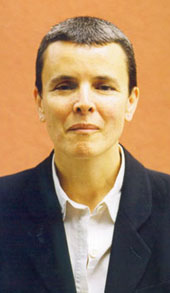***
 Today's poetry selection is by Taha Muhammad Ali, a Palestinian poet I'm late in coming to, though he has garnered the acclaim of a wide array of the global literati. (Including Michael Palmer.) Today on WNYC, I heard Adina Hoffmann on the hapless Leonard Lopate's show discussing her brand new biography of Ali, entitled My Happiness Bears No Relation to Happiness (Yale, 2009), which she claims is the first biography of a major Palestinian writer, a claim that strikes me as incredible (Can this be true?)
Today's poetry selection is by Taha Muhammad Ali, a Palestinian poet I'm late in coming to, though he has garnered the acclaim of a wide array of the global literati. (Including Michael Palmer.) Today on WNYC, I heard Adina Hoffmann on the hapless Leonard Lopate's show discussing her brand new biography of Ali, entitled My Happiness Bears No Relation to Happiness (Yale, 2009), which she claims is the first biography of a major Palestinian writer, a claim that strikes me as incredible (Can this be true?)Hoffman spoke about what distinguishes Ali's work for her, citing his combination of extraordinariness and his very ordinary background and life. Self-taught and a late starter, and still half his time maintaining a shop, Ali has managed to produce a body of work that can stand with the best, not only among his peers in the Middle East, but also globally. I admit that I've only read a handful of his poems, as I'm not that familiar with Palestinian poetry and have tended to read the work of the better known Adonis (whose poetry is more lyrical and experimental) and Mahmoud Darwish (who was work more overtly political), among others, but I found the few Ali poems I've read compelling. Back in 2007 he was featured on the News Hour with Jim Lehrer, and here's a snippet of what he said to interviewer Jeffrey Brown:
I'm posting the poem whose resonant, antitautological ending provided the title for Hoffman's book. (I found a copy of it on the Khalil Sakakini Cultural Center's website.) A trio comprising award-winner Peter Cole, Yaya Hijazi, and Gabriel Levin translated it. It's tight.TAHA MUHAMMAD ALI: I think there is two kinds of language, one for the news, for the politicians, and this is broad, and one for poetry. And this is beautiful and descriptive. And they are different, very different languages.
JEFFREY BROWN: Muhammad Ali insists that his poetry does speak to the conflict around him, but indirectly.
TAHA MUHAMMAD ALI: In my poetry, there is no Palestine, no Israel. But, in my poetry, suffering, sadness, longing, fear, and this is, together, make the results: Palestine and Israel. The art is to take from life something real, then to build it anew with your imagination.
WARNING
Lovers of hunting,
and beginners seeking your prey:
Don’t aim your rifles
at my happiness,
which isn’t worth
the price of the bullet
(you’d waste on it).
What seems to you
so nimble and fine,
like a fawn,
and flees
every which way,
like a partridge,
isn’t happiness.
Trust me:
my happiness bears
no relation to happiness.
12.IX.88
 It's officially Opening Day for the 2009 baseball season (the first game was played yesterday), and my ardor has cooled. Perhaps it's age or my mind on a different trip for a change or mental exhaustion, who knows, but I figure it'll gin up again after a weeks. Across the media spectrum the
It's officially Opening Day for the 2009 baseball season (the first game was played yesterday), and my ardor has cooled. Perhaps it's age or my mind on a different trip for a change or mental exhaustion, who knows, but I figure it'll gin up again after a weeks. Across the media spectrum the  At the
At the  Today's poet was only an incidental reference to me at first, an attribution ("after
Today's poet was only an incidental reference to me at first, an attribution ("after  Somehow or another over the years I've been posting poems, I've missed out posting a poem by poet
Somehow or another over the years I've been posting poems, I've missed out posting a poem by poet  The news on the unemployment front, like a great deal of what we read and see on TV, has been growing grimmer by the day, and the social conditions behind it are certainly grimmer still. Several people I know well, friends and relatives, have lost their jobs, and others are struggling to make ends meet. Alongside the weak job market, other signs of the economy's sickness are evident everywhere: plummeting home values and rising foreclosures; the appearance of Bushvilles; the collapse of the commercial real estate market; personal bankruptcies resulting from people's inability to pay debts; and on and on. These are only a portion of of the social crisis the country faces, and conditions are as bad or worse overseas. We're officially at 8.9% unemployment, though the reality is probably far worse, which is the worst things have been since the recessionary period around 1983. That was the year I graduated from high school, and one of the reasons I'm able to look back on that period without nostalgia is because, despite my fond memories of particular aspects of being 17 and 18 years old, my perception of the national situation was clear-eyed. In case you don't recall, in 1983 the ur-right winger, Ronald Reagan, was in office; a claque of extreme conservatives were frothing in their new government positions; the Cold War still raged; the AIDS pandemic was steadily increasing, with little attention for the federal government; the crack epidemic was picking up steam, and the concomitant drug war and buildup of the penal system were underway; the US was meddling in a war in Iraq (against Iran, no less, while secretly funneling money from Iran to right-wingers in Central America); and on and on. While I, though penniless and the child of a working-class background, was heading off to college and what I hoped would be a decent future, I was quite aware that things were terrible for others. The lack of jobs, particular for the poor and working-class, for black people, for Latinos, for undereducated whites, was a pressing national concern, which the GOP exploited brilliantly. It would be 10 more years and another recession (along with a young and conservative Democratic president) before the country really turned around. I hope it does not take that long this time, though the underlying conditions do appear to be worse than they were in 1983, or 1993.
The news on the unemployment front, like a great deal of what we read and see on TV, has been growing grimmer by the day, and the social conditions behind it are certainly grimmer still. Several people I know well, friends and relatives, have lost their jobs, and others are struggling to make ends meet. Alongside the weak job market, other signs of the economy's sickness are evident everywhere: plummeting home values and rising foreclosures; the appearance of Bushvilles; the collapse of the commercial real estate market; personal bankruptcies resulting from people's inability to pay debts; and on and on. These are only a portion of of the social crisis the country faces, and conditions are as bad or worse overseas. We're officially at 8.9% unemployment, though the reality is probably far worse, which is the worst things have been since the recessionary period around 1983. That was the year I graduated from high school, and one of the reasons I'm able to look back on that period without nostalgia is because, despite my fond memories of particular aspects of being 17 and 18 years old, my perception of the national situation was clear-eyed. In case you don't recall, in 1983 the ur-right winger, Ronald Reagan, was in office; a claque of extreme conservatives were frothing in their new government positions; the Cold War still raged; the AIDS pandemic was steadily increasing, with little attention for the federal government; the crack epidemic was picking up steam, and the concomitant drug war and buildup of the penal system were underway; the US was meddling in a war in Iraq (against Iran, no less, while secretly funneling money from Iran to right-wingers in Central America); and on and on. While I, though penniless and the child of a working-class background, was heading off to college and what I hoped would be a decent future, I was quite aware that things were terrible for others. The lack of jobs, particular for the poor and working-class, for black people, for Latinos, for undereducated whites, was a pressing national concern, which the GOP exploited brilliantly. It would be 10 more years and another recession (along with a young and conservative Democratic president) before the country really turned around. I hope it does not take that long this time, though the underlying conditions do appear to be worse than they were in 1983, or 1993. Now to today's poem excerpt, as I say, which needs little introduction, as nearly every English major, and many a non-major who took English classes in high school, will be familiar with it. I am talking about none other than the prologue to
Now to today's poem excerpt, as I say, which needs little introduction, as nearly every English major, and many a non-major who took English classes in high school, will be familiar with it. I am talking about none other than the prologue to  It's April 1, which means it's
It's April 1, which means it's